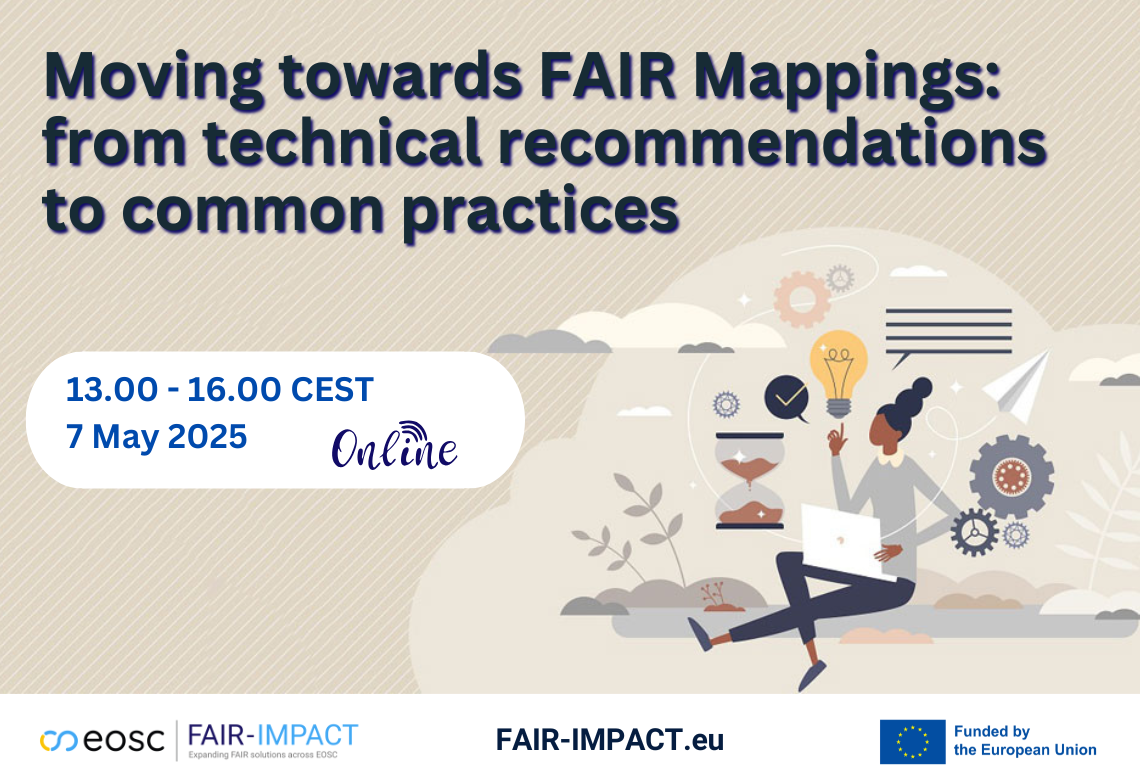FAIR-IMPACT runs workshops to discuss and address common issues related to mappings and crosswalks, including how to make mappings and crosswalks FAIR and how communities produce mappings and crosswalks between semantic artefacts and more. In this final workshop, we will assess the latest version of the practical mapping framework resulting from the previous workshops and interactions with the communities. In particular, we will discuss crucial practical aspects of mappings and crosswalks i.e. the sustainability and governance issues of such mappings. In parallel, we will present and discuss the FAIR Mapping recommendations to identify gaps and potential issues or refinement to deliver a community-revised final version of the recommendations.
Semantic artefacts – ontologies, terminologies, taxonomies, thesauri, vocabularies, metadata schemas and standards – are vital to achieving data interoperability. Indeed, they are essential to the implementation of the FAIR principles. With the growing number of semantic artefacts and their diversified uses, interconnecting these artefacts is critical but challenging. One approach to interoperability and integration is to identify/generate mappings/crosswalks between different artefacts of the same domain or the same type of information. Also known as ontology matching or alignment, it can be applied to any semantic artefacts.
There is a need to develop a strategy to create and subsequently manage mappings long term, and ensure they are made available, compliant with the FAIR principles, and hosted in relevant mapping repositories where they can be curated, integrated, and rendered for reuse. We continue to align this work more broadly, for example in collaboration with FAIRCORE4EOSC who develop the Metadata Schema Crosswalk Registry (MSCR).
FAIR-IMPACT is holding workshops to discuss issues around mappings and crosswalks and how they can become shareable and reusable, i.e., FAIR, elevating them to ‘first class’ citizens in the FAIR data world.
In our 1st workshop, ‘Why Mappings Matter and how to make them FAIR?’, we introduced participants to the motivation behind doing mappings and how practitioners could benefit further by making mappings FAIR, including methodologies, formats, tools, requirements for FAIR mappings and examples. Based on this workshop and several other workshops organised in the context of the Research Data Alliance, we established the FAIR Mapping recommendations which propose a set of technical recommendations to make mappings and crosswalks. In our 2nd workshop, ‘Documenting mapping community practices’, we investigated, with community examples, established mapping methodologies and processes being used, covering the various aspects of the mapping/crosswalk life cycle e.g. creation, curation, governance, maintenance, and update. From the different approaches, methodologies, and processes used across a diverse set of communities, we delivered a framework of 5 phases in our 3rd workshop “Developing a mapping process framework”, and trialled it live with different community use cases. In this 4th workshop, we will review the refinements suggested by the community to the first version of the framework, through a practical exercise, discuss how mappings can be sustained for future use, particularly with respect to their governance. In parallel, we will discuss our recommendations on how to produce and implement FAIR mappings and crosswalks. To conclude this workshop, we will engage with the experts participating in this workshop to discuss the future of the recommendations and of the practical framework.
Workshop format
This workshop will be roughly 1 hour of presentations on the topics listed, followed by interactive discussions. This workshop is organised by FAIR-IMPACT.
When: Wednesday 7 May 2025 - 13:00 to 16:00
Where: Zoom
AGENDA
| TIME (CEST) | TOPIC | PRESENTER |
|---|---|---|
| 13:00 - 13:05 | Welcome and introduction to workshop | Yann Le Franc, e-Science Data Factory |
| 13:05 - 13:15 | Presentation of the FAIR Mapping recommendations | Yann Le Franc, e-Science Data Factory |
| 13:15 - 13:30 | FAIR Mapping Framework | Nick Juty, The University of Manchester |
| 13:30 - 15:00 | Parallel Breakout sessions: FAIR Mapping recommendations Practical Mapping Framework |
|
| 15:00 - 15:10 | Break | |
| 15:10 - 15:20 | Summary of breakout groups | |
| 15:20 - 15:50 | Governance aspects overview & discussion | Parham Ramezani, LifeWatch |
| 15.50 - 16:00 | Closing remarks | Yann Le Franc, e-Science Data Factory |
